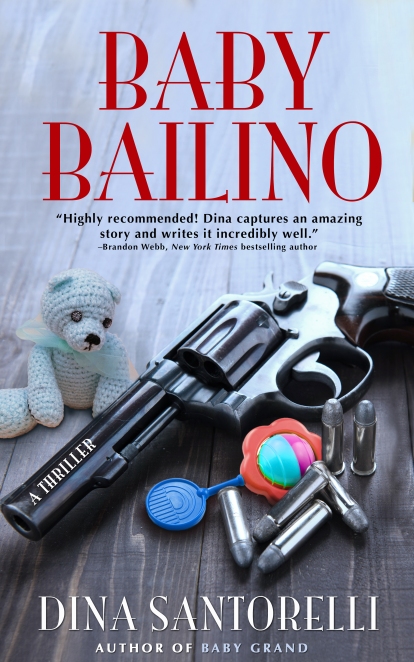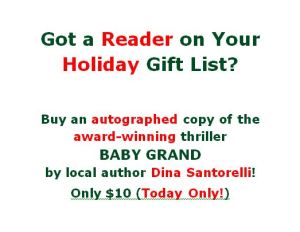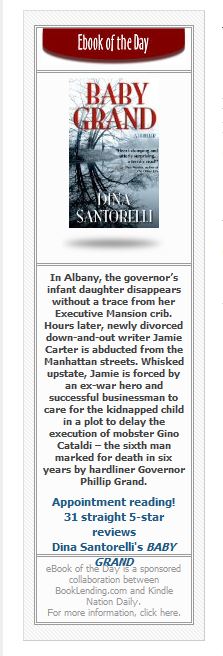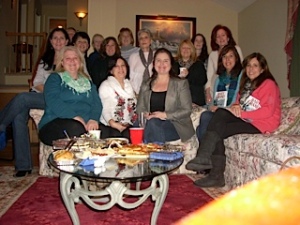 I’m so THRILLED to premiere the cover of the sequel to BABY GRAND — BABY BAILINO — coming out this fall! I decided to go with a more literal interpretation for the cover this time around, rather than conceptual, like Baby Grand’s. I’m sooooo happy with it. I think it really captures the flavor of the series. What do you think? Would love to hear your thoughts!
I’m so THRILLED to premiere the cover of the sequel to BABY GRAND — BABY BAILINO — coming out this fall! I decided to go with a more literal interpretation for the cover this time around, rather than conceptual, like Baby Grand’s. I’m sooooo happy with it. I think it really captures the flavor of the series. What do you think? Would love to hear your thoughts!
Book
Should You Ever Scrap Your Book?
I’ve often heard authors say how thankful they were that their first attempts at novels had never seen the light of day, how happy they were that those books had been rejected again and again by publishers, how first novels should never be read by anyone. I find comments like these to be so curious. If a writer had the diligence and patience to finish a book, even a bad one, I can’t imagine why he or she wouldn’t want to see that book through to the end and have it reach an audience?
I mean, bad books can be fixed, made better, transformed. Can’t they?
And while once upon a time, writers had no choice but to give up on a book when the only pathways to publication were forged through agents and publishers, nowadays, with self-publishing, anyone can publish anything. Is there any reason to leave a book in a drawer?
When your manuscript is rejected — from agents, publishers, beta-readers, creative writing professors — you really have three choices:
1.Scrap it, and start something else.
2. Ignore the advice, and keep querying or self-publish.
3. Fix the book, and then either keep querying or self-publish.
In my mind, authors should always strive for #3. Listen to what agents and beta-readers and publishers have to say, They know their stuff. But YOU know your story. If you have to, chop the manuscript into pieces and put it back together in a new, more creative, more concise way. Don’t let their comments diminish your excitement. Don’t be afraid of some more hard work — and good editing can be the toughest work of all.
So often, publishing a book is compared to parenting: Would you ever give up on a child? Would anyone even THINK about telling you to leave that one behind and start from scratch with another child?
Don’t give up. Make it work, as Tim Gunn of Project Runway likes to say. Remember your passion. Keep it with you as you make the tough choices.
In the end, whatever happens, whether you’ve created a best seller or turned a one-star book into a three-star book, I have to believe it will have been worth it.
Marketing Tip #6: Vendor Fairs
Yesterday, I took part for the first time in a vendor fair. Several of my author-friends have done fairs before, and the feedback I always get is that they’re hit or miss, either you sell lots of books or you don’t — and I should qualify that when I say “lots” I mean maybe three an hour. Since my local high school was hosting the fair and the money raised would be going to a scholarship fund, I thought I’d give it a try. And lo and behold, I sold lots of books!
There are things you can do to make your vendor fair appearances more successful. Here’s what I did:
1. Publicize the event. On social media in advance (if you like) and on the day of.
2. Create signage. I have a bunch of really cool plaques that I’ve made in the past regarding various contests that Baby Grand and I have placed in, but I needed some signs specific to this event. Keep in mind that your signs don’t have to be state-of-the-art. Mine were rather rudimentary. I created them last minute on Microsoft Word — I couldn’t access InDesign for some reason — and made them in, seriously, five minutes, but they worked: 
3. Bring with you the following items: table (be sure to know the size of your selling space and whether or not you have access to electricity), chairs (at least two — even if you’re alone it’s nice to have an additional seat, either for an unexpected friend or for your arm or purse to rest on), clean solid-colored tablecloth, sign-up sheet for your mailing list (even if folks don’t buy books, they often sign up, either out of interest or pity), a bunch of books (I brought 30), several Sharpies, a camera, and perhaps something to keep you occupied when things are slow (I brought my Kindle, although it never left my purse).
Should Writers Buy Books at Bookstores?
My answer is: If they want to.
The thing is, though, I don’t always want to.
In the wake of the news that Barnes & Noble’s CEO resigned, the future of our last remaining big-box bookstore remains unclear, and what I want to know is: Is this my fault?
I am, after all — hold onto your bookmarks! — a big Amazon devotee. I buy books from Amazon all the time. (I’m an Amazon Prime member, which gives me free, expedited shipping.) And I have been criticized by other writers for doing so. (Porter Anderson recently discussed how writers have been criticized just for LINKING to Amazon on their websites. Oy vey.) And I don’t understand why.
Does this also mean I should be buying my groceries from small little markets rather than supermarkets? Should I be patronizing neighborhood hardware stores instead of Home Depot? Should I be paying more for my books as I do for my eggs, which are cage-free? How did the demise of Barnes & Noble become my doing?
The way I see it, isn’t it inevitable that bookstores will eventually go the way of, say, record stores and video stores. Books — like music and video — is heading digital, whether we like it or not. Is Amazon really to blame for this? Am I to blame? I mean, I’m all for paying an extra dollar or two at a bookstore — be it a chain like Barnes & Noble or an indie — to keep it going, and to support all the great things that they do, but sometimes the price differential is significant — like 10 bucks per book. And when you buy as many books as I do, and make as little money as I do (starving artist, anyone?) we’re talking hundreds of dollars that I’d rather see go to cage-free eggs than the same exact book that I can buy for much less on Amazon.
I guess I just don’t understand the school of thought that says writers should be going out of their way to buy at Barnes & Noble. (BTW, as a self-published author, I can tell you that Barnes & Noble — and many indies, for that matter — aren’t going out of their way for me. Not that I’m bitter. Just sayin.’) Shouldn’t bookstores be finding ways to attract US? Shouldn’t we WANT to shop there? And not out of guilt?
What say you, writers? Am I a bad person?
(Note: Immediately after I pressed publish on this post, I discovered this link to a story titled, “Bookshops Stay Relevant, and Viable, as Centers for Public Discourse.” Now, THAT’S what I’m talking about! If bookstores want to attract book lovers, they should become a cultural center! I may not be hell-bent on buying Exploring Diabetes With Owls at your store on any given day, because chances are that it’s five bucks more than what Amazon wants me to pay, but if you’ve got David Sedaris giving a chat and signing books, I’d certainly pay an extra five bucks — if not more! — for that.)
Authors Reviewing Other Authors
I generally make it a rule not to rate or review books written by my author friends (unless I’m blurbing a book). I find that I’m too emotionally attached to the works to give an honest assessment. (Note: Amazon has made it a policy not to allow authors to review other authors, because they are deemed to be in direct competition with each other.)
However, I DO rate books on Goodreads written by authors I don’t know — you know, the dead ones, the famous ones, the ones who are far too busy raking in the dough to notice my little ol’ estimation of their work. Without that emotional attachment to the author or book, I feel like I can just write what I think, which (I hope) is helpful to others who look to a book’s reviews in deciding whether or not to read it. And that system is just fine and dandy when I like a book — slapping a five-star rating onto a book is joyous and fun. All is right with the world. However, when it comes time to give a one-star rating or a poor review, I find myself getting anxious, like I did with today’s review for Dan Brown’s INFERNO:
 1 of 5 stars This is the first audiobook I’ve listened to, so — to be fair — quite possibly it was the nature of “listening” to a book that wasn’t for me. However, I threw in the towel after about 4 and a half hours of listening. So disappointed. I absolutely loved THE DA VINCI CODE and really liked ANGELS & DEMONS. I had started THE LOST SYMBOL when it came out, but didn’t get far into it, because I found it to be more of the same, and I guess that’s how I feel about this book. Unfortunately, it was just taking too long for things to get going. What a bummer.
1 of 5 stars This is the first audiobook I’ve listened to, so — to be fair — quite possibly it was the nature of “listening” to a book that wasn’t for me. However, I threw in the towel after about 4 and a half hours of listening. So disappointed. I absolutely loved THE DA VINCI CODE and really liked ANGELS & DEMONS. I had started THE LOST SYMBOL when it came out, but didn’t get far into it, because I found it to be more of the same, and I guess that’s how I feel about this book. Unfortunately, it was just taking too long for things to get going. What a bummer.
I feel incredibly ambivalent about this review — any bad review, for that matter. Sure, I didn’t like the book, but I keep thinking about that old adage: “If you have nothing nice to say, don’t say anything at all.” Particularly because I KNOW how hard it is to write a book. (It’s crazy hard.) And I KNOW how hard it is to receive a poor review. (It’s crazy harder.)
5 Book Club Tips
In promoting Baby Grand, I’ve done all kinds of appearances. Bookstores. Libraries. Assisted living communities. (Street corners.) But probably my absolute favorite thing to do is attend book club meetings. Sitting in a casual circle, talking about the book that I wrote and everyone read, and seeing up close how readers have taken ownership of the novel’s characters and how they defend them, fight for them, question them, hate them, love them. Hearing how someone was at the edge of her seat as Jamie plotted to escape from her abductors, how some were surprised by the ending, had guessed a few things, had a few questions, can’t wait for the sequel. It’s probably the closest thing to bliss with regard to being novelist that I can describe — other than that amazing feeling, when you’re actually writing, of being so swept away and in the moment that you don’t even know where the ideas you’ve just put on paper have come from.
And there are some things that authors can do to make their book club appearances even more memorable and worthwhile. Here are five:
- Have handouts. Every book club has its own way of doing things, but many of them have a facilitator who runs the meeting. Sometimes you will be asked to serve as facilitator, as I was for the book club meeting I attended last night. As facilitator, I brought handouts for all the members that included discussion questions for Baby Grand, as well as my contact information (email, Twitter, Facebook) so that I could maintain relationships with readers. Even if you are not asked to facilitate, business cards or book marks with your contact info or perhaps information on your next book, including the publication date, can be helpful.
Writing Tip #107
Feeling ‘trapped’ when penning a sequel. A fellow writer, Betsy Arnold, sparked a very interesting discussion on my FB page today. She said — with regard to penning a “companion book” to a novel:
“I keep having to go back and check the facts from my first book which were throwaways at the time. Now they are parameters with which I’m stuck. Is that true for you?…I keep having to consult my maps and timelines. Ugh. I want to change a few things in the first book, but can’t. It’s a strange feeling.”
Indeed, it is. And she is totally right. In a sequel, or companion book, you are confined by the “throwaways” (good word!) that you created in the first book — your character was born here, in a place and time that you provided for him, whether purposefully or arbitrarily (it makes you realize how very important every decision you make in your novel is!). As I told Betsy, you can always have a character dye his hair or decide he doesn’t like mashed potatoes anymore. But it’s true that that character has to be born where you decided he was born in the first book — unless, of course, the entire first book was a hallucination or dream (Bobby Ewing, anyone?). Although the novel I’m working on now, In the Red, is a stand-alone, my next book will be a sequel to my first novel, Baby Grand. I’ve started working on it a bit, and already I’m experiencing the things Betsy mentions: Having to check back to the first book to make sure I’m being consistent so that fans of the first book won’t be standing outside my house with pitchforks demanding a public apology or a new edition.
Yes, it can feel confining, but remember that only those starting points have to remain the same (character names, descriptions, etc.). Characters can move, change their minds, denounce their families, find a time machine and do just about anything they want to do. Although some things may be etched in stone, the rest is a wonderfully blank canvas.
Kindle Nation Daily Sponsorship: Worth It?
 On August 19, 2012, Baby Grand was Kindle Nation Daily’s eBook of the Day.
On August 19, 2012, Baby Grand was Kindle Nation Daily’s eBook of the Day.
My goal for the sponsorship was to introduce Baby Grand to readers who have never heard of the book or of me or my blog — to connect with complete strangers who might enjoy a good thriller. And, hey, if I could make a little money too, even better.
Kindle Nation Daily is a popular promotional choice for Kindle authors (when I purchased the sponsorship back in June there were only two dates left for August). KND offers all kinds of sponsorships, including daily and weekly options, as well as packages, that run from about $30 and up, and their newsletters and websites connect with tens of thousands of readers.
The sponsorship I purchased, eBook of the Day, is priced at $159.99. A bit steep. So right off the bat, I knew there was a good chance that I might not recoup my investment since I had planned on selling Baby Grand at the promotional price of $1.99 that day, which meant that I’d need to sell about 270 books (since Amazon offers 35 percent royalties for books priced under $2.99) to break even.
Book Trailers #2
When I first wrote about book trailers back in November 2010, they were a growing trend in independent book promotion. Now they’re pretty standard as part of a marketing strategy, as many indies and traditionally published authors have them.
That is, except me.
Last week, my writer-friends in the Long Island Writers Group were urging me to do a book trailer for Baby Grand.
Truth be told, I’ve been hesitant. Here’s why:
- A professionally done book trailer costs $$$$. Over the last few years, I’ve seen tons of book trailers, many of them not very good or effective. And I really think a bad book trailer reflects poorly (just like a film trailer would) on its book, which might be incredibly good. So if I were to do a book trailer, I’d want it to be professionally done. That means it’s going to cost me some $$$$, which leads me to…
- Are they worth the investment? I know that lots of books have book trailers, but I’m still not sure how effective they are in actually the selling the book. I can’t think of anyone who says, I’m thinking of reading Book ABC. Let me look for the book trailer first (and they have to find it!) and see what I think. Most people just hop on over to the book’s Amazon page and take a look at the book cover, synopsis and reviews. At least that’s what I do. I rarely look at a book trailer, even if there’s one right there on the Amazon book page or author page.
However, I do have to say that there have been book trailers I’ve stumbled upon that I found to be quite effective — meaning they made me not only want to read the book, but go and buy the book.
Here’s two of them:
Advance Praise for ‘Baby Grand’
Here’s a sampling of some of the advance praise for Baby Grand. Thank you to all of you who took the time to read my debut novel. I am grateful for your kindness and humbled by your kind words.
- “A perfect thriller from Dina Santorelli—heart-stomping, emotion-packed and utterly surprising. Readers will be gripped by the tightly woven story and richly layered characters. A terrific read!”
—Ellen Meister, author of The Other Life
- “What an enjoyable read! It pulled me in at the beginning and didn’t let go until the last page. Very difficult to put down! I’m already looking forward to the author’s next book.
—Joseph Mugnai, publisher, Family magazine
- “A superb debut for Dina Santorelli. A well-crafted novel that’s also a page-turner. Baby Grand’s a winner; you won’t want to put it down.”
—Julia Markus, critically acclaimed biographer and winner of the Houghton Mifflin Literary Award for her novel Uncle
- “Dina Santorelli has the gift of a natural storyteller, and Baby Grand sweeps along at a frantic pace, plunging the reader into a tale with wonderfully real characters you care about. It’s very human, very exciting, and absolutely engrossing.”
—Chris Nickson, author of the Richard Nottingham series of historical mysteries

